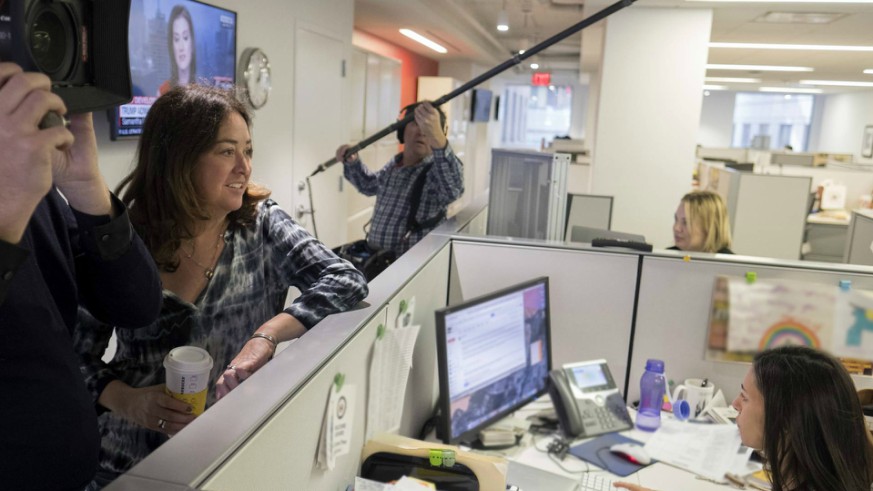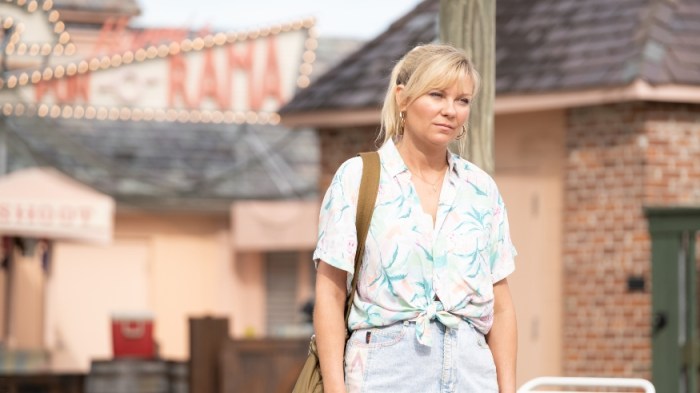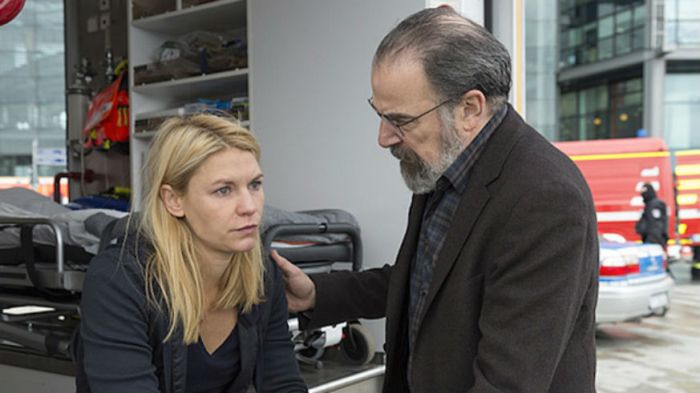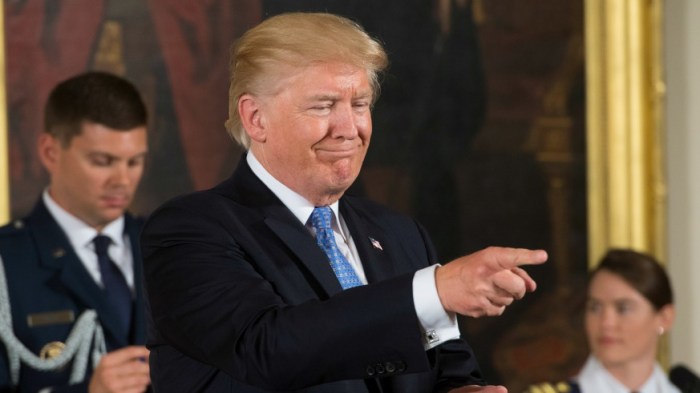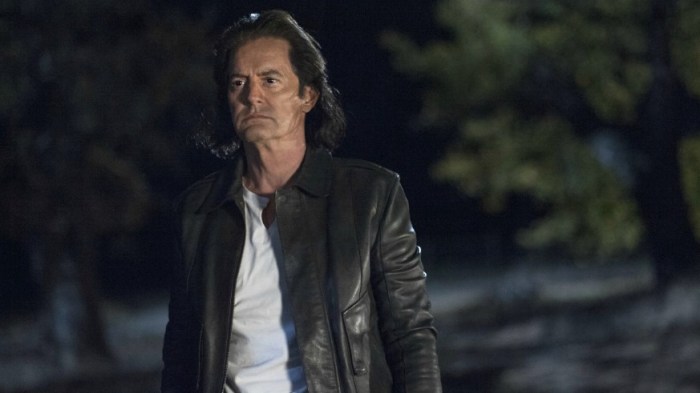A relentless, exhausting energy permeates throughout The Fourth Estate, the gripping documentary that showcases Donald Trump’s first year as president through the eyes of the New York Times, the first episode of which closed the Tribeca Film Festival on Saturday night.
That intensity was still prominent when I talked to its co-director and producer Jenny Carchman and producer Justin Wilkes earlier this week, as they were busy helping director Liz Garbus edit its fourth and final episode. Thankfully, they were still able to tell me quite a lot about “The Fourth Estate,” Donald Trump and The New York Times, all of which you can read below.
Talk about the origins of the documentary.
Jenny: After Trump was elected director and producer Liz Garbus, I don’t know if you remember –
Justin: We all remember when he was elected, we are trying to forget.
Jenny: [Laughs] Trump had wanted a meeting with the New York Times. First he had asked the New York Times to come to him, then they wanted him to come to them. Then it was going to be off the record. They wanted it on. They had a meeting in the New York Times, and Maggie Haberman was live-Tweeting in the meeting. Liz was reading those Tweets and she wanted to be a fly on the wall in the room. That’s when she asked if she could cover the first year of Trump’s presidency through their lens. It took a little while, but they ultimately agreed. And we spent a year deep inside.
Justin: Everyone at the Times noticed that this was a historical moment. And the idea of memorializing that and really giving the outside world a front seat to the real hard work they are doing as journalists to tell the truth. It is one thing to read the story and another to see the hard work that goes in to making it. Especially at a time when the president is accusing the Times and others of being fake, and being fake news and sort of criticizing the underlying foundation of the truth. The Times to their credit jumped on board because they saw this as an extraordinary moment. They allowed cameras everywhere.
Did you film everyday?
Jenny: We strategized when to film. We filmed about 150 days over the last year. We would film once a week in Washington and once a week in New York, and mostly more than that. We used our intuition when to be there. There were days when we knew announcements were coming and we planned to be there. Then there were days that we just got our camera and ran down and spent 2 days at the office. That’s what it was like when Comey was sacked, which we see in Episode 2. I basically had a bag packed all the time.
Did the reporters have to adjust to you?
Jenny: There was definitely an adjustment. Both offices are very different. New York is very, very big, there are many, many people. The DC bureau is very small, we were in people’s way. But people knew that this was such a huge moment and it needed to be documented. Otherwise they would have told us, ‘Get out. You can’t be here.’ But feeling the pressure of reporting, and feeling the pressure of the White House, all while being recorded was grueling. They have all said that to us. I don’t know if they ever truly opened their arms and said, ‘Come and film us during the most highly pressurized moment of my life.’ But they were very gracious and courteous, especially under pressure.
Was there a positive moment about Trump that you took away from the film?
Jenny: The election showed we don’t know about how the country feels or works. We are all located here on the east or west coast and we are surrounded by people that are voting for Hillary Clinton. But there was a huge population that wasn’t. Trump’s victory showed us the tenacity of the Republican Party and the way that they are behind Trump. But it also showed us that there is a huge part of the country that we don’t know how they feel. And I think the Times is trying to address that also. Dean Banquet [New York Times Editor] says that in the film, ‘I was wrong about the country. We all thought Hillary was going to win.’
There’s that line from him in the opening episode, ‘We were behind on the approach.’ Do you think they have caught up?
Justin: I think it is unfortunate in this situation that the focus continues to shift, from Russia to the trials and tribulations in the White House, so much bandwidth and air time is taken up on his steps and missteps and you really do question the policies that he promised during the election coming through. Does he actually represent the people that voted for him? We see in further episodes that Times reporters do leave New York and they go into the middle of the country, and they see that there is very strong base that supports him and don’t pay attention to what they and he considers to be the fake news reporting of the Russia investigation and the infighting White House. They are still looking for someone that is going to represent them.
Was it hard to pick which story to follow?
Jenny: For sure. There were so many factors. First of all people have to want to be followed and filmed. Then we wanted to try and understand the breadth of this story. So we tried to pick stories and reporters that would do that. Episode 2 and 3 and 4 actually do look at the people that are supporting Trump. 1 is setting the stage, 2 takes us out of the office and into America. We get to hear from supporters and why they supported Trump, without being judged. One reporter goes to meet some people whose financial situations are very poor and they say, ‘It is OK, because he is promising to build a wall.’ And you realize that they truly believe it and are supporting.
By the time you left were the reporters exhausted by Trump?
Jenny: Even reading the Michael Cohen stuff from the last few days, nobody can anticipate this stuff, and nobody knows anything, and the confusion and the excitement and the unpredictability of this is still there. To them this is still a great story. That’s how they see it. That’s how they approach it. It is not emotional, it is really about following the facts, and the process of getting the story. That’s where their focus is. It’s not, ‘Holy sh**, I can’t believe this is happening.’ It’s, ‘Holy sh**, how are we going to get this right.’
What was your biggest takeaway from the documentary?
Justin: Just how robust the reporters and everyone at the Times are and how commited they are to getting this story right. This is one of the biggest story of our times. And at a time when journalism and the likes of the Post and the Times are under fire, it reminds us how important these institutions are. Especially because the Times have been with us for 100 years and will be with us for another 100 years, and in someways this is just one story from a much longer book that is being written in real time. It was an impressive reminder of the men and women that are dedicating themselves to telling this story and how important that is today.
“The Fourth Estate” is a four-episode docu-series that will be available across SHOWTIME platforms including On Demand and streaming on Sunday, May 27.
The first 90-minute episode of the series will debut on-air on May 27 at 7:30 p.m ET/PT on SHOWTIME. Subsequent episodes will air on SHOWTIME on Sunday nights at 8 p.m. ET/PT.

